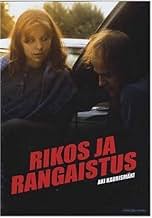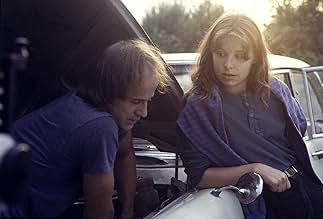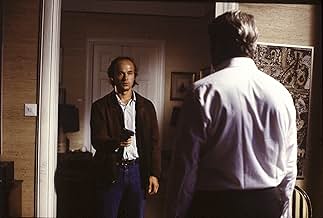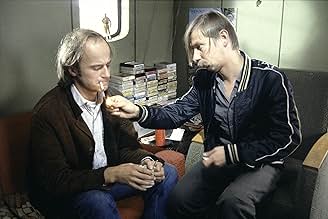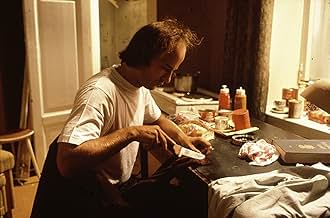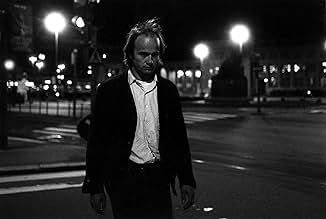IMDb RATING
7.0/10
3.5K
YOUR RATING
A slaughterhouse worker and former law student, takes vengeance on the man who killed his fiancée in a hit and run accident.A slaughterhouse worker and former law student, takes vengeance on the man who killed his fiancée in a hit and run accident.A slaughterhouse worker and former law student, takes vengeance on the man who killed his fiancée in a hit and run accident.
- Director
- Writers
- Stars
- Awards
- 2 wins & 1 nomination total
Pedro Hietanen
- Pianist
- (as Pedro's Heavy Gentleman)
Hannu Lemola
- Drummer
- (as Pedro's Heavy Gentleman)
Heljä Angervo-Karttunen
- Opera Singer
- (uncredited)
Juuso Hirvikangas
- Man at the Police Station
- (uncredited)
Jorma Hynninen
- Opera Singer
- (uncredited)
- Director
- Writers
- All cast & crew
- Production, box office & more at IMDbPro
Featured reviews
Just half an hour ago I finished watching the Finnish director's take on Dostoyevsky's wonderful classic novel Crime and Punishment. I knew not to expect a faithful adaptation and in fact, didn't even wish to see one, feeling intrigued at the idea that this literary favourite of mine had been transposed to contemporary Helsinki. As expected, this was really very, very loose as far as literary adaptations go. Yet the core of the novel's concerns were there, so eloquently expressed by its straight-forward and non-symbolic title: CRIME and, as a consequence of the former, PUNISHMENT. And the central concern of all this is not IF the punishment occurs, but HOW and ultimately, WHY it happens.
People seldom smile in Kaurismaki's Helsinki, and have pensive, reflective ways and a deliberateness about them, whether they are police inspectors or pastry shop employees. Rather than the process that brought Antti Rahikainen (Kaurismaki's Raskolnikov) and his conscience to turn himself in to the police, I was struck by the way the movie plays with the spectator's sympathies. Rahikainen inspires sympathy one moment and lack of it the next; then, once again, you develop sympathy followed by antipathy and a desire to see him punished. At least I found it to be the case, and it wasn't that I mentally chastised him for the murder, either. As Rahikainen himself twice said during the course of the movie, you don't really feel like he's killed a man, so much as a principle. The film doesn't go to great lengths to explain what principle that might be, but you can somehow intuit it, and even approve of his actions to some degree - at least in a very abstract sense. And it's not even like the murdered man is ever presented as being repulsive! If there was ever a crime movie more cerebral than this, I would really like to hear about it! One quality I admire in Kaurismaki that's perfectly illustrated by this movie is his use of interior spaces. The way he films rooms with people in them, though it's done in an absolutely subtle, functional and non-showy way, really gives a sense of their context within the world they inhabit and the thoughts and feelings that float around them in said rooms and interiors. The very last frame of the guard shutting the prison door behind Rahikainen after he's been speaking to Eeva (roughly the equivalent of Sonya from Dostoyevsky's novel), really gives a sense that the spaces you inhabit are mostly a reflection of your state of mind, your interior state. After having seen the young murderer in his grotty rented room before, emprisoned within his own musings and guilt, the literal prison he occupies after he turns himself in seems no more restictive of his freedom than his previous mental state. In this sense, Kaurismaki's Crime and Punishment is very similar to the spirit of Dostoyevsky's novel.
People seldom smile in Kaurismaki's Helsinki, and have pensive, reflective ways and a deliberateness about them, whether they are police inspectors or pastry shop employees. Rather than the process that brought Antti Rahikainen (Kaurismaki's Raskolnikov) and his conscience to turn himself in to the police, I was struck by the way the movie plays with the spectator's sympathies. Rahikainen inspires sympathy one moment and lack of it the next; then, once again, you develop sympathy followed by antipathy and a desire to see him punished. At least I found it to be the case, and it wasn't that I mentally chastised him for the murder, either. As Rahikainen himself twice said during the course of the movie, you don't really feel like he's killed a man, so much as a principle. The film doesn't go to great lengths to explain what principle that might be, but you can somehow intuit it, and even approve of his actions to some degree - at least in a very abstract sense. And it's not even like the murdered man is ever presented as being repulsive! If there was ever a crime movie more cerebral than this, I would really like to hear about it! One quality I admire in Kaurismaki that's perfectly illustrated by this movie is his use of interior spaces. The way he films rooms with people in them, though it's done in an absolutely subtle, functional and non-showy way, really gives a sense of their context within the world they inhabit and the thoughts and feelings that float around them in said rooms and interiors. The very last frame of the guard shutting the prison door behind Rahikainen after he's been speaking to Eeva (roughly the equivalent of Sonya from Dostoyevsky's novel), really gives a sense that the spaces you inhabit are mostly a reflection of your state of mind, your interior state. After having seen the young murderer in his grotty rented room before, emprisoned within his own musings and guilt, the literal prison he occupies after he turns himself in seems no more restictive of his freedom than his previous mental state. In this sense, Kaurismaki's Crime and Punishment is very similar to the spirit of Dostoyevsky's novel.
Kaurismaki's formal debut is a straight-faced drama set in moody Helsinki that is not however particularly engaging and save for a few inspired moments doesn't really have something to recommend it to the casual viewer. The story revolves around a socially disassociated, aloof man working in a meat factory, who one day shows up in the doorstep of an upper class businessman and simply explains that he's there to kill him then shoots him dead. The rest of the film combines a detective thriller (thriller in the mildest sense of the term) and a psychological drama and is largely okay in both departments.
I find Kaurismaki's very basic approach to film-making to be refreshing compared to the cynic, gimmicky cinema of our days that is more content to wink at the audience than take the material it presents seriously. The dialogue is as sparse as the plot is thinly stretched and everything in 'Crime and Punishment' has a very minimalist feel to it. It's rather short, clocking at almost 90 minutes, but after Kaurismaki gets done with the setup and motive and general background of the killer, and this happens around the half mark, he just doesn't have a whole lot of places to go with the rest of the film.
As a debut and an exercise in film-making for the young director it's impressive, but it's also monotonous and very one-note and just not very interesting.
I find Kaurismaki's very basic approach to film-making to be refreshing compared to the cynic, gimmicky cinema of our days that is more content to wink at the audience than take the material it presents seriously. The dialogue is as sparse as the plot is thinly stretched and everything in 'Crime and Punishment' has a very minimalist feel to it. It's rather short, clocking at almost 90 minutes, but after Kaurismaki gets done with the setup and motive and general background of the killer, and this happens around the half mark, he just doesn't have a whole lot of places to go with the rest of the film.
As a debut and an exercise in film-making for the young director it's impressive, but it's also monotonous and very one-note and just not very interesting.
Normally, a filmmaker doesn't choose to adapt a literary classic for his first feature, as it might prove to be too hard. Aki Kaurismäki, on the other hand, did an excellent job with his directorial debut, a modern-day version of Dostoyevskji's Crime and Punishment.
At the beginning, we're guided through a slaughterhouse. This is where the protagonist, Antti Rahikainen (Markku Toikka), works. This particular environment suits the film, as it prepares us for its subsequent tone. Rahikainen takes the rest of the day off and breaks into an apartment. Once there, he kills an old man. Unfortunately, there's a witness: Eeva Laakso (Aino Seppo), who however refuses to turn in the murderer, thinking he will himself confess the crime eventually.
Of course, that doesn't happen. Police inspector Pennanen (Esko Nikkari) is dead certain of Rahikainen's role in the story, given there's a motive and all (the victim accidentally killed Rahikainen's fiancée by running her over with a car). But with no evidence and no collaboration from Eeva, there are few chances the killer will be arrested.
Kaurismäki has done a remarkable job on his first film, mostly because he nails the mood: he shows us the murkiest sides of Helsinki, and almost everyone depicted in the movie is cold and unemotional, a factor which adds to the unsettling nature of the story. There's little room for humor, with only a few exceptions: Rahikainen's best friend Nikander (Matti Pellonpää), struggling with English lessons, and the straight, serious delivery of some dialogue, most notably the first conversation between Rahikainen and Eeva ("What's wrong with him?" "Nothing. He's dead." "How did he die?" "I killed him.").
An excellent human drama, and also the beginning of a brilliant career. Those interested in Finnish cinema should give this a look.
At the beginning, we're guided through a slaughterhouse. This is where the protagonist, Antti Rahikainen (Markku Toikka), works. This particular environment suits the film, as it prepares us for its subsequent tone. Rahikainen takes the rest of the day off and breaks into an apartment. Once there, he kills an old man. Unfortunately, there's a witness: Eeva Laakso (Aino Seppo), who however refuses to turn in the murderer, thinking he will himself confess the crime eventually.
Of course, that doesn't happen. Police inspector Pennanen (Esko Nikkari) is dead certain of Rahikainen's role in the story, given there's a motive and all (the victim accidentally killed Rahikainen's fiancée by running her over with a car). But with no evidence and no collaboration from Eeva, there are few chances the killer will be arrested.
Kaurismäki has done a remarkable job on his first film, mostly because he nails the mood: he shows us the murkiest sides of Helsinki, and almost everyone depicted in the movie is cold and unemotional, a factor which adds to the unsettling nature of the story. There's little room for humor, with only a few exceptions: Rahikainen's best friend Nikander (Matti Pellonpää), struggling with English lessons, and the straight, serious delivery of some dialogue, most notably the first conversation between Rahikainen and Eeva ("What's wrong with him?" "Nothing. He's dead." "How did he die?" "I killed him.").
An excellent human drama, and also the beginning of a brilliant career. Those interested in Finnish cinema should give this a look.
By making "Crime and Punishment",director Aki Kaurismaki has given some typical Finnish touches to a Russian literature classic. Seriousness in all scenes is evident in this film set in Helsinki where protagonists Antti Rahikainen and Eeva Laakso are so honest in their portrayals as victims that viewers get a feeling that they are watching a drama film which has shades of a criminal act.One is a victim of life whereas another person is a victim of circumstances.This effect can be seen in absolutely dead pan performances by Finnish actors Mr.Markku Toikka and Ms.Aino Seppo who convincingly play their parts.By making "Crime and Punishment",Aki Kaurismaki has also joined a select league of reputed filmmakers such as Luchino Visconti,Andrzej Zulawski and Makk Karoly who have made films based on works by famous Russian writer Fyodor Dostoyevsky who is considered as an undisputed master of human psychology.What works in Mr.Kaurismaki's favor is the fact that his film "Rikos Ja Rangaistus" is a faithful adaptation of Russian classic "Crime and Punishment".Some of the scenes in this film have been shot in such a natural manner that viewers will tend to believe that "Rikos Ja Rangaistus" has just been influenced by "Crime and Punishment". Mr.Kaurismaki is modest when he suggests that he has made a good film in his "so-called" career as he can never make a classic film.However, Rikos Ja Rangaistus is already hailed as a classic film as Mr. Kaurismaki has taken perfect care of script and thereby extracted wonderful performances from all his actors.
This adaptation of Fyodor Dostoevsky's novel "Crime and Punishment" was Finnish director Aki Kaurismäki's first film, and it shows. Later, one of his pictures ("The Man Without a Past" (2003)) would be nominated for a Best Foreign-Language Film Oscar, but this initial effort is amateurish. Not technically, that is, but its transmutation from page to screen is prosaic and oblivious to the stylistic and thematic qualities of the book and how to translate them cinematically. I've sought out two dozen movies inspired by Dostoevsky's tale now since reading it, and although this is hardly the worst, it's in some ways the most daft and pointless.
As with many bad adaptations, it's chiefly concerned with story, and Kaurismäki and his co-screenwriter actually do a rather good job at condensing a vast novel into about an hour-and-a-half runtime. The characters are reduced to four main ones, with the Sonya type taking on qualities of one of the murder victims in the source, as well as of Raskolnikov's sister. The Svidrigaïlov type likewise assumes the part of another of Dostoevsky's characters to accuse Raskolnikov or murder. Similar to the 1935 American version, this character is also shoehorned into the traditional function of a heavy instead of the rather amusing rapscallion he was in prose. Meanwhile, the Sonya isn't a religious hooker with a heart of gold, and Raskolnikov isn't a writer whose murder is an expression of his philosiphizing.
I'm especially displeased that the film does away with this self-referential device of a surrogate author within the story (see Robert Bresson's "Pickpocket" (1959) for how this framework can be quite fruitful). Moreover, Kaurismäki fails to replace the religious and philosophical dialogues of Dostoevsky's work absent here with anything interesting. He begins with his Raskolnikov working in a meat-packing plant, but does nothing to suggest any link between the cutting of flesh and his subsequent murder of a man. In fact, the film changes the murder from being done with an axe in the novel to, here, performed with a gun. I mean, talk about blowing a perfectly good opportunity for a visual motif of cutting bodies apart! This is what I mean by "amateurish." Simple opportunities are wasted, and nothing compelling is put in their place.
The relatively-deadpan acting, or otherwise apparent lack of emotional conveyance, is another odd choice here for being based on an intense book for which the god-like, omnipresent narration looked into the thoughts of its characters. Here, we can't even read the actors' faces and body language because they're so expressionless. The protagonist, at least, conveys an occasional wry sense of humor. This is a rare version that actually shows the Raskolnikov with a slight smile in his climactic look with the Sonya as he discovers she's followed him. But, for the most part, his behavior merely seems erratic. The actress playing the Sonya is worse--I think it's just a bad performance. The police inspector here is another character who could be jovial and witty in prose, but is purely a bore on screen. Again, Bresson worked better with affectless amateur actors in "Pickpocket," and he employed voiceover narration in addition to the surrogate author device to get inside the mind of the protagonist. The 1923 silent German version also reflected Raskolnikov's inner torment well by representing it in the Expressionist set design.
Some of the scenes that Kaurismäki decided to linger on are equally perplexing. Besides the butchering episode, for example, I fail to see the interest of watching the sexist Inspector inform his wife when she's allowed to go to bed, nor why the film spends time watching him drink alcohol. Indeed, there are a few pointless scenes in this one of characters drinking. Although not as bad as another adaptation, "Norte: the End of History" (2013), in this respect and others, it's still flummoxing. When Dostoevsky's characters drank, there were reasons, and they tended to go on at length as to what they were. Too much time is spent on the filmmakers' apparent interest in English-language mood music, as well. Moreover, it's hard to discern what the point of this adaptation was at all. If it were to inhabit Helsinki, then show the city. This is based on a book where the main character repetitively wandered the streets of Saint Petersburg until it becomes almost familiar to even a reader who's never been (and certainly never in Dostoevsky's time). We don't get that here; another opportunity squandered as the film's protagonist talks more about lonely walks than we actually see him doing it. We inhabit, however, parts of Bresson's Paris, or, heck, even that of the entirely artificial settings of the 1923 picture. As much as I dislike "Norte," it does, at least, explore its Filipino locales better than this Finnish counterpart. And, to conclude, this Raskolnikov claims that he's always been alone; yet, we hardly ever see him alone in this picture. Even the one time he drives off by his lonesome, he immediately turns back around. From the first to last scene, he's usually surrounded by people, and he forms intimate relationships with at least two of them. Without demonstrating the statement, to leave it by itself is trite.
This is a blunder of a first film. There's no apparent understanding of the source text, nor a coherent vision of what to make of it. It's not an impossible novel to adapt. Bresson arguably made a masterpiece out of it, Robert Wiene did well in the silent era, the 1935 French version at least rendered the story and acting well--heck, Woody Allen has attacked it thrice now. But, that this Finnish one isn't even the worst tells you that others (and by rather well-respected filmmakers, to boot, including twice-Oscar-nominated Josef von Sternberg (1935), "Russian Ark" (2002) director Aleksandr Sokurov (1994) and slow-cinema arthouse filmmaker Lav Diaz (2013)) have failed, too.
As with many bad adaptations, it's chiefly concerned with story, and Kaurismäki and his co-screenwriter actually do a rather good job at condensing a vast novel into about an hour-and-a-half runtime. The characters are reduced to four main ones, with the Sonya type taking on qualities of one of the murder victims in the source, as well as of Raskolnikov's sister. The Svidrigaïlov type likewise assumes the part of another of Dostoevsky's characters to accuse Raskolnikov or murder. Similar to the 1935 American version, this character is also shoehorned into the traditional function of a heavy instead of the rather amusing rapscallion he was in prose. Meanwhile, the Sonya isn't a religious hooker with a heart of gold, and Raskolnikov isn't a writer whose murder is an expression of his philosiphizing.
I'm especially displeased that the film does away with this self-referential device of a surrogate author within the story (see Robert Bresson's "Pickpocket" (1959) for how this framework can be quite fruitful). Moreover, Kaurismäki fails to replace the religious and philosophical dialogues of Dostoevsky's work absent here with anything interesting. He begins with his Raskolnikov working in a meat-packing plant, but does nothing to suggest any link between the cutting of flesh and his subsequent murder of a man. In fact, the film changes the murder from being done with an axe in the novel to, here, performed with a gun. I mean, talk about blowing a perfectly good opportunity for a visual motif of cutting bodies apart! This is what I mean by "amateurish." Simple opportunities are wasted, and nothing compelling is put in their place.
The relatively-deadpan acting, or otherwise apparent lack of emotional conveyance, is another odd choice here for being based on an intense book for which the god-like, omnipresent narration looked into the thoughts of its characters. Here, we can't even read the actors' faces and body language because they're so expressionless. The protagonist, at least, conveys an occasional wry sense of humor. This is a rare version that actually shows the Raskolnikov with a slight smile in his climactic look with the Sonya as he discovers she's followed him. But, for the most part, his behavior merely seems erratic. The actress playing the Sonya is worse--I think it's just a bad performance. The police inspector here is another character who could be jovial and witty in prose, but is purely a bore on screen. Again, Bresson worked better with affectless amateur actors in "Pickpocket," and he employed voiceover narration in addition to the surrogate author device to get inside the mind of the protagonist. The 1923 silent German version also reflected Raskolnikov's inner torment well by representing it in the Expressionist set design.
Some of the scenes that Kaurismäki decided to linger on are equally perplexing. Besides the butchering episode, for example, I fail to see the interest of watching the sexist Inspector inform his wife when she's allowed to go to bed, nor why the film spends time watching him drink alcohol. Indeed, there are a few pointless scenes in this one of characters drinking. Although not as bad as another adaptation, "Norte: the End of History" (2013), in this respect and others, it's still flummoxing. When Dostoevsky's characters drank, there were reasons, and they tended to go on at length as to what they were. Too much time is spent on the filmmakers' apparent interest in English-language mood music, as well. Moreover, it's hard to discern what the point of this adaptation was at all. If it were to inhabit Helsinki, then show the city. This is based on a book where the main character repetitively wandered the streets of Saint Petersburg until it becomes almost familiar to even a reader who's never been (and certainly never in Dostoevsky's time). We don't get that here; another opportunity squandered as the film's protagonist talks more about lonely walks than we actually see him doing it. We inhabit, however, parts of Bresson's Paris, or, heck, even that of the entirely artificial settings of the 1923 picture. As much as I dislike "Norte," it does, at least, explore its Filipino locales better than this Finnish counterpart. And, to conclude, this Raskolnikov claims that he's always been alone; yet, we hardly ever see him alone in this picture. Even the one time he drives off by his lonesome, he immediately turns back around. From the first to last scene, he's usually surrounded by people, and he forms intimate relationships with at least two of them. Without demonstrating the statement, to leave it by itself is trite.
This is a blunder of a first film. There's no apparent understanding of the source text, nor a coherent vision of what to make of it. It's not an impossible novel to adapt. Bresson arguably made a masterpiece out of it, Robert Wiene did well in the silent era, the 1935 French version at least rendered the story and acting well--heck, Woody Allen has attacked it thrice now. But, that this Finnish one isn't even the worst tells you that others (and by rather well-respected filmmakers, to boot, including twice-Oscar-nominated Josef von Sternberg (1935), "Russian Ark" (2002) director Aleksandr Sokurov (1994) and slow-cinema arthouse filmmaker Lav Diaz (2013)) have failed, too.
Did you know
- TriviaAki Kaurismäki's narrative directorial debut. He chose this project after reading François Truffaut's interview with Alfred Hitchcock, where Hitchcock claimed Crime and Punishment was the one book he would never adapt, because "it would be too difficult." Kaurismäki later admitted it was too difficult.
- Quotes
Antti Rahikainen: [to Eeva Laakso] I'll tell you something. The man I killed is not important. I killed a louse, and became one myself. The number of lice remained constant. Unless I was one from the very beginning - but that's not important. I wanted to kill a principle, not a man.
- ConnectionsFeatured in Selección TCM: Aki Kaurismaki (2012)
- SoundtracksCadillac
Written by Kim Brown, Denys Gibson, Ian Mallet, Stuart Graham Johnson and Vince Taylor
Performed by The Renegades
- How long is Crime and Punishment?Powered by Alexa
Details
- Release date
- Country of origin
- Official site
- Language
- Also known as
- Crime and Punishment
- Filming locations
- Production company
- See more company credits at IMDbPro
Box office
- Budget
- FIM 1,726,378 (estimated)
Contribute to this page
Suggest an edit or add missing content


